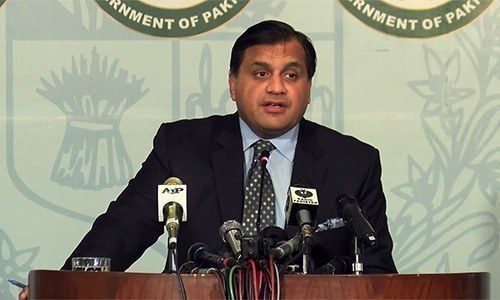ISLAMABAD: The Foreign Office on Thursday expressed the hope that India would agree to reconvene a meeting of the two countries on Kartarpur corridor agreement so that an accord could be finalised at the earliest.
“We are keen to hold the meeting to finalise the draft agreement at the earliest … We hope India will agree to hold a meeting, at the earliest,” FO spokesman Dr Muhammad Faisal said at the weekly media briefing.
India had forced the postponement of the last meeting on Kartarpur agreement scheduled for April 2 at Wagah by refusing to attend the second round of talks on the pretext of its reservations over the appointment of `controversial’ figures in Kartarpur committee by Pakistan and differences on logistical elements of the agreement.
Read: Pakistan regrets India's decision to postpone upcoming Kartarpur meeting
India had then said that the talks could be scheduled again “at an appropriate time after receiving Pakistan’s response”.
New Delhi refused to attend April 2 talks expressing reservations over composition of panel by Pakistan
At the first round of talks held at Attari, India had demanded that the minimum number of pilgrims crossing the corridor to visit the shrine in Pakistan be raised to 5,000 and on special days like Gurpurab and Baisakhi 10,000 pilgrims should be allowed. Moreover, Indians wanted the corridor to remain open throughout the year without any closed days. It was also demanded by the Indian side that pilgrims intending to visit the shrine on foot should also be allowed to do so and there should not be any documentation requirements for the pilgrims.
Pakistan had then regretted Indian decision saying New Delhi did not wait for its (Pakistani) response and that it (Pakistan) had been trying to find consensus on the issue.
Dr Faisal told the media briefing that the next meeting, whenever held, would specifically “discuss differences related to proposals of both countries for operationalising the corridor and to align positions to build convergence”.
The corridor, which would provide visa-free access to Indian Sikh pilgrims to Kartarpur Gurdwara, is planned to become operational in November on the occasion of 550th birth anniversary of Guru Nanak Dev Ji.
The Evacuee Trust Board of Pakistan, the spokesman said, was launching a special coin and postal stamp to commemorate the 550th birth anniversary of Baba Guru Nanak.
In reply to a question about the latest round of technical level talks on Kartarpur Corridor held on April 16, to which Pakistan had agreed despite the negotiations on the agreement having been put in limbo by India, Dr Faisal said Pakistan agreed to the talks out of its commitment to operationalise the corridor.
“The talks were conducted in a cordial environment and they had focused on various technical issues including hydrology. Both sides agreed to share the technical design/parameters for passage of flood water at the earliest,” he said.
Commenting on the Quetta Hazarganji attack and the killing of bus passengers on the Makran Coastal Highway in Ormara, Balochistan, the spokesman pointed to the arrest of Indian spy Kulbhushan Jadhav from the province suggesting that foreign involvement could not be ruled out.
“Investigations into the tragic incidents are under way and we are closely monitoring the situation. If we find any involvement from the Indian side, we will definitely raise the issue with India and take appropriate measures,” he said.
Dr Faisal asserted that if the foreign involvement was found, Pakistan “will expose it vociferously, as it has done in the past, and take appropriate counter measures as well”.
The spokesman feared that increased hostilities in Afghanistan could undermine the progress made towards the peace and reconciliation process.
He was responding to a question about the spring offensive announced by the Taliban, while at the same time holding talks with the US and moving towards the intra-Afghan dialogue.
“Since the direct talks between the US and Taliban began, chances of peace in Afghanistan have become brighter. Pakistan believes that all sides must give peace a chance and continue the dialogue, which is the only way to bring peace and stability in Afghanistan,” the spokesman further said.
About the upcoming intra-Afghan meeting in Doha from April 19 -21, he said: “We hope that the intra-Afghan dialogue will lead to peace in Afghanistan.”
He described the meeting as “a positive development” and expressed the hope that these talks would lead to durable peace and stability in Afghanistan.
“Pakistan is doing everything in its capacity to facilitate the peace process, and it would keep urging both sides to restrain from active hostility,” he added.
Published in Dawn, April 19th, 2019














































